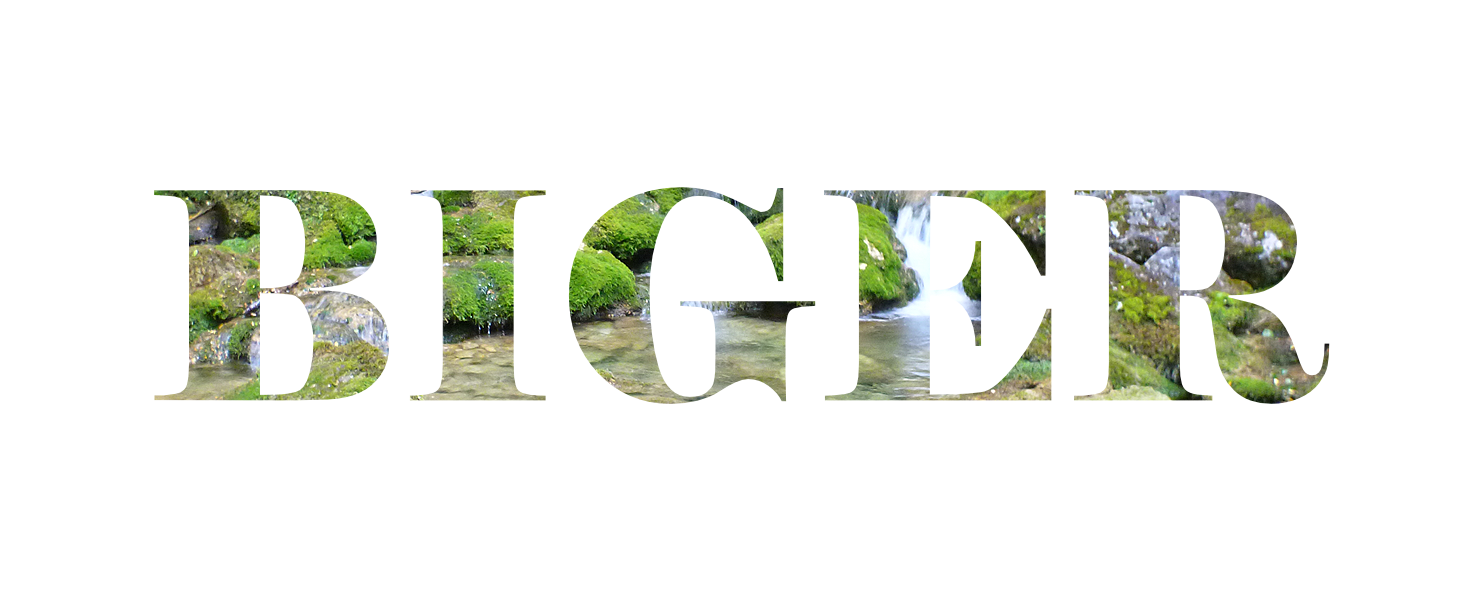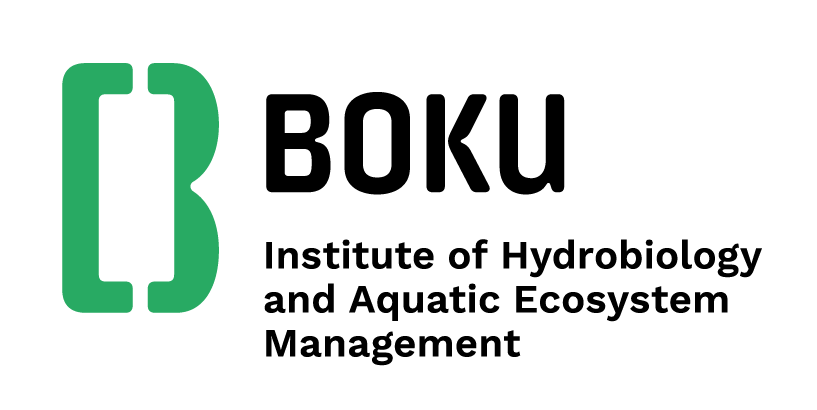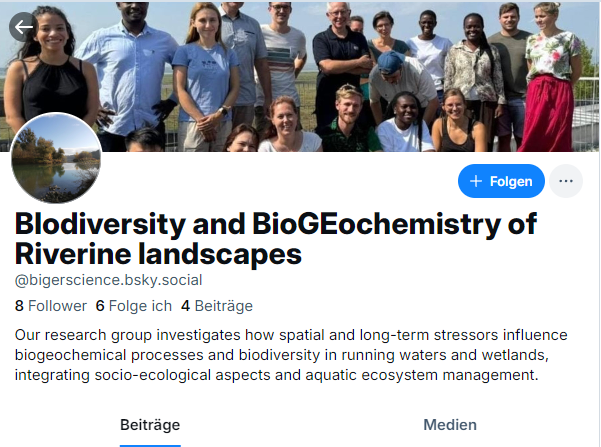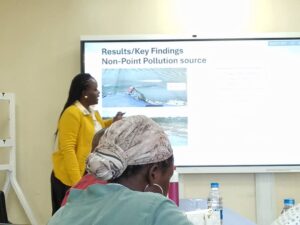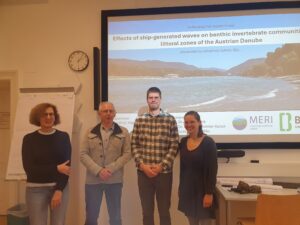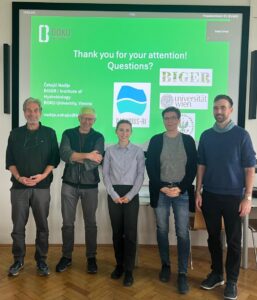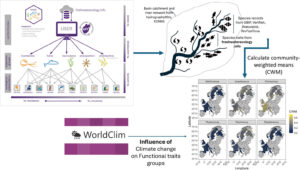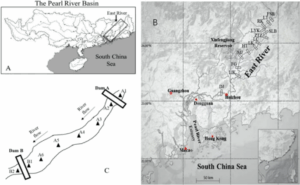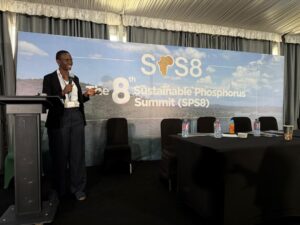
BIodiversity and BioGEochemistry of Riverine landscapes
Biger in the News
New Scientific Paper Published: River-Floodplain Metacommunities as Complex Networks: The Interplay of Species Interactions, Dispersal, and Environment
A recent study authored by Andrea Funk, István Czeglédi, Tibor Erős, Lukas Landler,Paul Meulenbroek, Didier Pont, Brizuela Sonia Recinos, Alice Valentini, and Thomas Hein, has been published in Environmental DNA.
A paper presents advances in the use of environmental DNA (eDNA) for monitoring aquatic biodiversity. The study demonstrates how genetic material collected from water samples can be used to reliably detect aquatic species, including those that are rare or difficult to observe. These findings highlight the value of eDNA as a non-invasive tool for biodiversity assessment, conservation, and environmental management.
To read the full article online, please click here: https://doi.org/10.1002/edn3.70239
Promoting Resilient Water Services: Flawia Byekwaso’s Talk at the 2025 Uganda Water Conference
Our group member, Flawia Byekwaso, attended the ‘Uganda Annual Water Utilities – Regulator’s Conference 2025’ (8th–10th December 2025) at the Ministry of Water and Environment Auditorium in Kampala. The conference focused on Accelerating Inclusive and Resilient Water and Sanitation Services for Sustainable Development.
Her talk, ‘Monitoring Natural Wetland Services for Urban Water Infrastructure Performance with Emphasis on Regulation of Water and Sanitation Services’, under the mentorship of Thomas Hein, made a significant contribution to addressing water ecological issues. The robust discussions sparked by her presentation are expected to foster a professional and supportive environment for the country and may promote future collaborations in the sector.
New Study Applies Hydrodynamic Modeling to Assess Flood Impacts on River Microbial Communities
A recent article in Applied and Environmental Microbiology: ‘Changes and drivers of bacterioplankton communities within plain river networks during the rainy season (high inflow event): simulation of the water level using the MIKE11 model’, presents new insights into how extreme rainfall shapes ecological processes in plain-river systems. The study, authored by Jun Zhao, Thomas Hein and Lachun Wang, applies the MIKE11 hydrodynamic model to simulate water-level and flow dynamics during high-inflow events. The study shows that high inflows cause clear shifts in bacterioplankton communities, including reduced richness and changes in community structure.
The findings underline how hydrology, chemistry and land use interact to affect microbial biodiversity, supporting BIGER’s focus on multiple stressors and ecological processes in freshwater landscapes.
To read the full article, please click here: https://doi.org/10.1128/aem.01124-25
BIGER Annual Working-Group Retreat 2025 at Kalkalpen National Park
Last weekend, the BIGER working group gathered at Kalkalpen National Park for its annual retreat, a productive combination of scientific exchange and time in nature.
The retreat brought together our group members to share updates on ongoing projects, discuss new ideas, and explore future collaboration opportunities. Between sessions, we also enjoyed the park’s beautiful winter scenery, providing a refreshing backdrop for informal discussions.
Feeling inspired and energised, our group is ready to take on the research challenges of the year ahead.
Congratulations Johannes Kührer!
A big congratulations to Johannes Kührer for successfully defending his Master’s thesis „Effects of ship-generated waves on benthic communities in littoral zones of the Austrian Danube“, supervised by Thomas Hein, Andrea Funk, Elisabeth Bondar-Kunze, and Anna-Lisa Dittrich.
This research enhances our understanding of how navigation impacts biodiversity in industrialized rivers, contributing valuable insights for sustainable river management.
Well done, Johannes!
The study is important for the MERI, MARITE, DANSER, ACWA and several other EU projects.
Exciting New Publication
A recent study entitled “ ‘specleanr’: an R package for automated flagging of environmental outliers in ecological data for modeling workflows“, authored by Anthony Basooma, Astrid Schmidt-Kloiber, Sami Domisch, Yusdiel Torres-Cambas, Marija Smederevac-Lalić, Vanessa Bremerich, Paul Meulenbroek, Martin Tschikof, Andrea Funk, Thomas Hein, Florian Borgwardt, has been published in Ecography.
Authors have released a new R package called specleanr, offering 20 methods to detect outliers in species occurrence data based on environmental variables. The package uses LOESS regression to define thresholds and classifies records by their likelihood of being anomalies. specleanr is versatile and can be used beyond ecological modeling for any data analysis requiring robust outlier detection.
To read the full article online, please click here: https://doi.org/10.1002/ecog.08221
Congratulations Nadija Čehajić!
Nadija Čehajić have successfully defended her Master thesis entitled: „Spatial patterns of greenhouse gas emissions in a floodplain system“, supervised by Univ.Prof. Dr. Thomas Hein, Mag., Dr. Elisabeth Bondar-Kunze and Dr. Anna Katarzyna Sieczko.
The study is important for the DANUBIUS and several EU projects.
New Scientific Paper Published: Introducing fwtraits – an R package for obtaining freshwater biodiversity trait information
A recent study authored by Anthony Basooma, Florian Borgwardt, Sami Domisch, Merret Buurman, Vanessa Bremerich, Sonia Steffany Recinos Brizuela, Martin Tschikof, Thomas Hein, and Astrid Schmidt-Kloiber has been published in Basic and Applied Ecology.
The paper presents fwtraits, an open-source R package that provides easy access to ecological trait data for freshwater biodiversity research. It enables scientists to retrieve, filter, and analyse species traits efficiently, supporting trait-based ecological and functional assessments. By promoting data transparency and integration, fwtraits helps improve the consistency and reproducibility of freshwater ecosystem studies.
To read the full article online, please click here: https://doi.org/10.1016/j.baae.2025.10.010
New Scientific Paper Published
A recent study titled ‚The dynamics of linked social–ecological action situations reveal governance changes in the Austrian Danube ‘, authored by Yanhua Shi, Sonia Steffany Recinos Brizuela, Thomas Hein, Andrea Funk, and Christian Kimmich, has been published in Journal of Environmental Management.
This research applies a novel integrative modeling framework to assess how land‐use change, and hydrological alteration drive nutrient exports in riverine systems. The authors combine field measurements, statistical models, and scenario analysis to disentangle direct and indirect influences on nutrient fluxes. Their results demonstrate that shifts in landscape connectivity and flow regimes substantially affect nutrient loads, with implications for catchment management and water quality policy.
To read the full article online, please click here: https://doi.org/10.1016/j.jenvman.2025.127662
Responses of Oligochaeta and Chironomidae to restoration of connectivity in a river–floodplain stretch of the Upper Danube River – a new paper was published
A new paper co-authored by Dr. Sonia Recinos Brizuela, Prof. Dr. Thomas Hein, Dr. Andrea Funk and co-authors has been published in Restoration Ecology. The study discusses how restoration goals can be adapted to ongoing environmental changes, highlighting that returning ecosystems to their historical state is often no longer realistic.
The authors propose more flexible, forward-looking strategies that focus on ecosystem resilience and functionality under future conditions. This shift in perspective supports the development of adaptive management approaches in restoration practice.
The article is available online: https://doi.org/10.1111/rec.70238
New Scientific Paper Published: Phytoplankton similarity indices as ecological metrics in a fragmented river system
A new study co-authored by Thomas Hein and Olena Bilous, and colleagues, explores how dam-induced fragmentation affects phytoplankton communities in China’s East River. The paper, published in Hydrobiologia, shows that non-dominant algal groups are surprisingly strong indicators of environmental change, offering new insights into monitoring river ecosystem health.
The study highlights how cascading dams can transform river systems into lake-like environments, reducing spatial diversity and altering nutrient dynamics. These findings contribute to improving ecological assessment methods for regulated rivers worldwide.
To read the full article online, please click here: https://link.springer.com/article/10.1007/s10750-025-06022-w
8th Global Sustainable Phosphorus Summit (SPS8), 30 September – 3 October 2025, Accra (Ghana)
Sharon Gubamwoyo had the privilege of attending the 8th Sustainable Phosphorus Summit in Accra, Ghana, with a major focus on achieving sustainable phosphorus management in Africa and globally. The summit enabled collaborations, innovation, and capacity development.
